By the calendar, it’s mid-summer here in California. Our growing season is longer than most, given our mild climate and rich, agricultural soil. That said, pumpkins and sunflowers adhere to their own cycle and that cycle is coming to an end.
Like many things in life, the anticipation often outranks the reward at the end. It’s the growing that brings so much pleasure. It’s also humbling to realize that much of what’s happening outside these four walls has nothing to do with me. Nature knows what she’s doing. While a bit of help from water, fertilizer and nutrient-rich soil is a must, once provided she can take it from there.
I tend the garden anyway, battling drought conditions, air pollution, nasty bugs and the adorable menace, the western gray squirrel. I’m a caretaker more than anything else.
Once you’ve gardened, it’s impossible to feel the same way about the fruits and vegetables that make it to your table. Something as tiny and unassuming as a seed has all the DNA it needs to know when and where it should grow and for how long. Helpers, in the form of pollinating bees or seed-scattering birds, also play a role. I’ve gardened my entire life and I’m still in awe when a seed cracks the earth and a leafy green sprout appears.
According to Boundless Biology:
Seed plants are cultivated for their beauty and smells, as well as their importance in the development of medicines. Plants are also the foundation of human diets across the world . Many societies eat, almost exclusively, vegetarian fare and depend solely on seed plants for their nutritional needs. A few crops (rice, wheat, and potatoes) dominate the agricultural landscape. Many crops were developed during the agricultural revolution when human societies made the transition from nomadic hunter–gatherers to horticulture and agriculture. Cereals, rich in carbohydrates, provide the staple of many human diets. In addition, beans and nuts supply proteins. Fats are derived from crushed seeds, as is the case for peanut and rapeseed (canola) oils, or fruits such as olives.
We live in an amazing world.

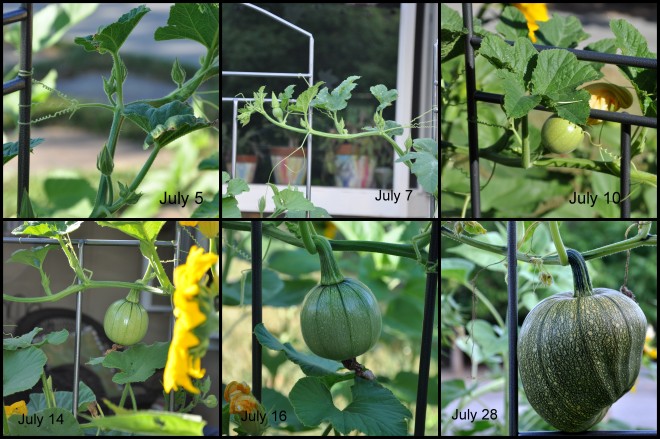
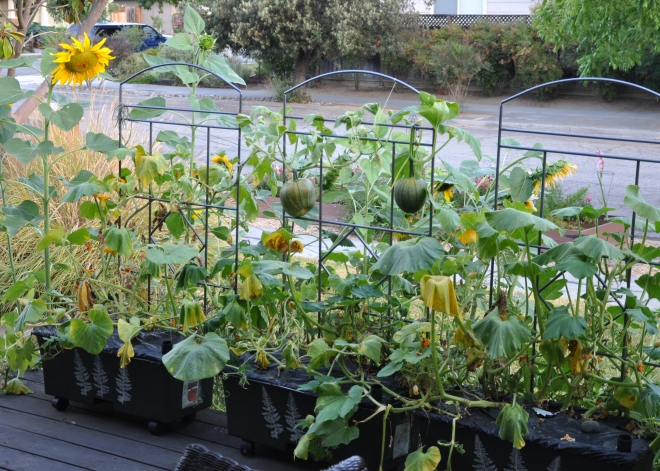
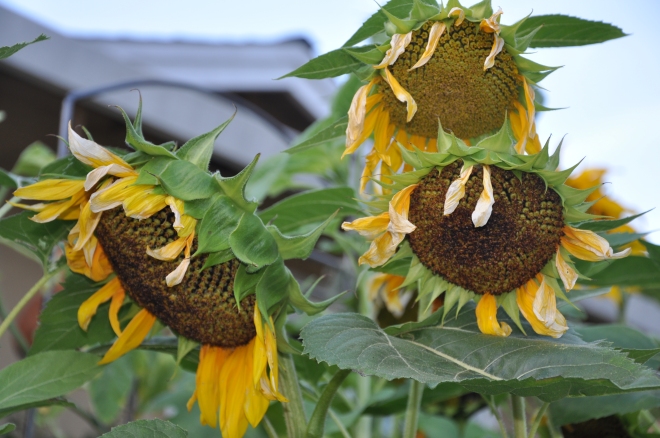
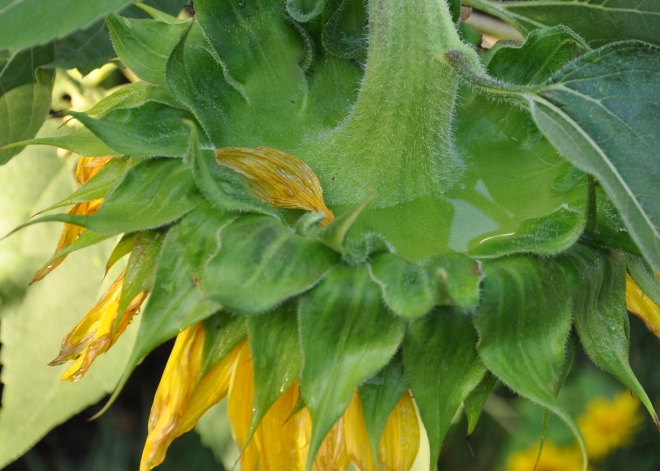
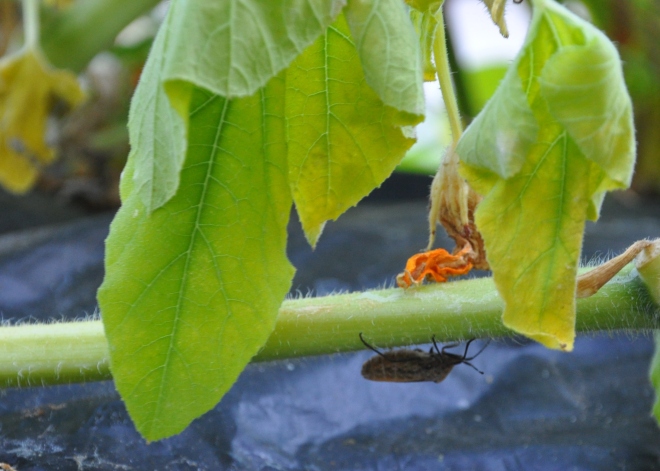
Time is racing by – your garden has gone from verdant to dying in one blog post – or so it seems to me! I love your take on this stage, the sunflower head bowing from the weight of the seeds, the fading vines as the energy goes to the fruits. A gardener and a poet 🙂
It is almost August and time for me to start digging in the compost I have been making over winter and preparing my soil for the vertical garden which is to come……. 🙂
LikeLiked by 1 person
Pauline, I am so excited for you. The rebirth of a garden is a beautiful thing. Between your brewing compost and the DE you’ll have a healthy, snail free and gorgeous garden. Vertical too. Can’t wait to see.
Thanks for calling e a poet today. That made me sit up a bit taller in my chair. You!!! xox
LikeLiked by 1 person
😀 ❤
LikeLike
Ditto ↑↑↑
LikeLike
Yup, growing season in California is definitely longer and faster. I just had my first really-starting-to-grow pumpkin on my blog today;0) I have a city garden nowadays, so any I will guard that pumpkin indeed against all menace that is trying to eat before me;o) Love this post!
LikeLike
Thank you!
Hurray for your first pumpkin. Urban gardens are wonderful. I wish everyone had one. Last year I left the squash bugs unchecked, not knowing the damage they would do. This year I’m hand picking them, scraping eggs of the stems or removing leaves with eggs on the underside. They’re not gone but definitely curtailed.
LikeLike
We do indeed live in an amazing world! And I love the notion of gardeners being caretakers. It is so true.
I agree with Thecontentedcrafter. It seems only last week’s post that you were planting the sunflowers and pumpkins. That was another couple of months that I heard whizzing past!
LikeLike
Thank you, Anne. Nice to hear from you. Both pumpkins and sunflowers are 90 day crops, give or take a few. It is hard to believe that three months have passed.
My sons go back to school in three weeks!
LikeLike
It does seem to me like summer is zipping by. We’re still into warmer than usual weather but soon the nights will grow longer and cooler here in the north and we’ll be into fall again. I think that somehow signals gardens here too. It’s all a short but pleasant activity. I was at a hardware store today and they still had so many plants and planters. I felt sorry for them and the plants. Our summer was slow to arrive this year. I was thinking, “or darn little plant, what will they do with you over winter?” I’m pretty sure I’d have to learn how to garden all over again given your calendar and climate.
So how will you cook your squash? I think I hear some of my squirrel friends rubbing their wee paws together and smacking the widdle wips….The sunflowers look like a real bounty for those little guys. Will you have a winter garden too? Like Lettuce, turnip and such? xo
LikeLike
Summer goes so fast as it becomes fall and the garden moves into a final stage…It is all so amazing. I look forward to it each year with the anticipation of a 10 year old. It never ceases to amaze me.
LikeLike
mmm, I typed a reply and it disappeared.
I’m not even sure what I said now, ha! I do tend to rattle on.
I was wondering what you’d make with your squash? I think your squirrels are rubbing their widdle paws and licking their lip over the idea of the yummy sunflower heads soon be set out for them.
Oh, I was telling how I was at the hardware store today and noticed all the plants they still have. Since our summer was late to arrive, I think people cut back. I feel sorry for these plants to not find a home in the sunshine. I can’t imagine how they’d save them over winter. I’m actually not sure if I would like to garden all year round. Maybe in our small yard now but not at the lake, that’s for sure. If we could do it together, that’d be more fun. xoxo
LikeLike
Squash and pumpkins do grow at an amazing rate, I feel that if I stand still near mine, they’ll use me as a plant support. I like your frames and think I must look at growing mine vertically next year as they do spread themselves out.
LikeLike
Yes, gardening has made me so much more aware of the world, environment, climate etc, and of what I eat, even if I can’t grow much myself. I’ll be harvesting some Nigella seeds soon – have you tried eating them? Your pumpkin boxes seem to be a successful way to grow squash… maybe good for zucchini too. I once saw an enormous specially made “compost” heap in a public garden where the pumpkins were growing out of it at all angles and creating quite a show!
LikeLike
Everything has it’s time. It does seem sometime that the planet is tipping sideways with the strange weather. But the natural world knows how to adapt. Hope those pumpkins get a lot bigger so they will be pretty Halloween decoration.
LikeLike
You’re right, Marlene. We may well be at the beginning of a huge shift. We’ll see where it goes, and hopefully have learned from the past and don’t further muck things up.
I fear the pumpkins won’t get much bigger now that they are turning orange. Not our best crop year, but fun nonetheless.
LikeLike
Excellent post and comments, Alys.
Update on my one remaining sunflower: well … it’s alive with the new growth being about 1 inch tall. HA!! Not sure it will ever make it! I feel like I am nurturing an ICU patient 🙂
LikeLike
Oh dear. Are you sure it’s a sunflower? It seems so small and late in production. Did you receive it as a seed or small plant?
If anyone can save it, you can!
LikeLike